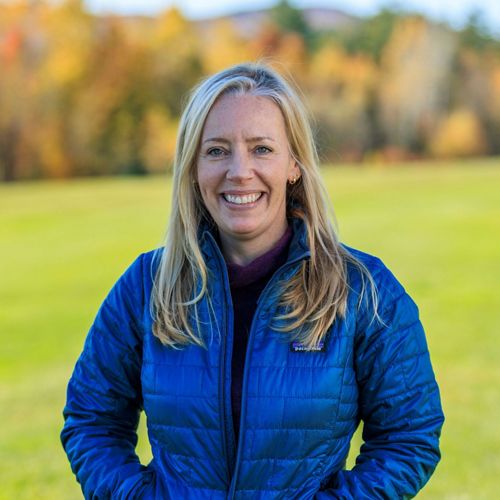Rachel Rouillard
State Director in New Hampshire
Durham, New Hampshire

Rachel Rouillard Rachel is State Director in New Hampshire. © Jerry Monkman/EcoPhotography
Areas of Expertise
Administration and Executive Management, Natural Resource Management, Public Policy
About Rachel
Rachel Rouillard has been a strong, trusted, well-known advocate for the Granite State’s lands and waters for decades. Prior to becoming State Director, she served as Director of Conservation Strategy in New Hampshire. In this role, she directed and managed TNC's conservation program, assuring its capacity to advance conservation, restoration and climate adaptation priorities to protect land and water for people, and to help ensure a resilient future across the state and the Northern Appalachians.
Before joining TNC, Rachel spent more than a decade as executive director of the Piscataqua Region Estuaries Partnership—an Environmental Protection Agency Clean Water Act Program housed at the University of New Hampshire—which focuses on the health of Great Bay, designated as an estuary of national significance by Congress under the National Estuaries Program. Prior to that, she was appointed by New Hampshire Governors Jeanne Shaheen and John Lynch and served the State of New Hampshire for two terms as the founding executive director of the Land and Community Heritage Investment Program (LCHIP), an independent state authority that makes matching grants to Granite State communities and non-profits to conserve and preserve New Hampshire's most important natural, cultural and historic resources. During her tenure, LCHIP invested in the protection of over 200,000 acres across the state. Rachel is also a former Trustee of the Board of Directors for Leadership New Hampshire, which works to build a community of informed and engaged leaders across the state.
A Granite State native, Rachel earned a B.A. in Geography from Keene State College and a M.A. degree in Public Administration from the Harvard Kennedy School in Cambridge, Massachusetts. She lives on the seacoast, where you may find her out on the trails, in an art studio or out seeking some local oysters for dinner (or lunch!) Rachel Rouillard can be reached at rachel.rouillard@tnc.org.
Get to Know Rachel
Rachel, tell us a bit about yourself. Where did you get your love of nature?
Well, our parents were science teachers, so my brother and I learned to appreciate the natural world in so many ways from the time we were kids. A quirky thing my dad used to do was pick up roadkill he thought was ‘in good shape’ and put it in our freezer so he could show us, then take it to school to share with his students. True story: After school one day, a friend of mine opened a bag from the freezer and, instead of finding ice cream or something, she found a flying squirrel! Of course we thought that was totally normal! We also took two summer-long, cross-country camping trips where we went to lots of national parks, mainly out west. The Morning Glory Pool at Yellowstone really blew my mind. But overall, I think it was just learning to be curious—to marvel at the details, purpose and uniqueness of every living thing.
Why The Nature Conservancy?
I’ve admired TNC’s collective work for decades because they are innovators. The scale and reach of the work is so inspiring, and I think that’s because of the commitment to continuous learning and adaptation. TNC has been able to advance creative, effective, and transformative solutions to address such a broad range of challenges and advance the pace and scale of conservation. It’s powerful stuff when you combine science with human creativity and passion—and TNC is a stand-out at doing that.
What are you most excited to work on?
I’m really excited about connecting and protecting whole landscapes—the functioning ecosystems we need to survive and thrive. And, working with diverse groups of people to tell the story about exactly how these protected places are working for them and keeping them, their families and communities healthy. The increasing focus on the connection between nature and people is something I’m really passionate about. I want people to be curious about the natural resources that are where they live—to understand and appreciate the connections between us and the life that sustains us, if even just in the place a person lives—their garden, yard, neighborhood, town or city park or forest. If we can reconnect people to these landscapes and places with meaning and heart, we can accomplish SO much more.
What gives you hope?
What a great question. Lots of things give me hope—I’m a sort of pathological optimist. I’m hopeful for what will happen given the pace of change (science and tech) and how motivated the younger generation is to address climate change. But also, that increasingly, solutions are circling back to our natural systems. I think people are understanding that more and more—to simply enable nature and its processes, not try to contain or control it.
Any book recommendations?
Yes! Please read Braiding Sweetgrass by Robin Wall Kimmerer if you haven’t yet. It’s so beautifully written and inspiring, but also poses some tough questions. Also, I’m just re-reading The Immortal Life of Henrietta Lacks, which I think is a really important (true) story to understand through the lens of the pandemic and the social justice movement we are in. Last but definitely not least, anything by Barbara Kingsolver – she is my very favorite author.